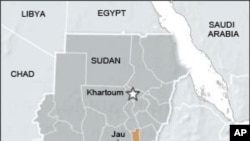A high-level international team of mediators is gathering in Ethiopia's capital for another try at easing tensions that have brought Sudan and South Sudan to the brink of war. Diplomatic efforts are aimed at salvaging a crucial summit meeting that was canceled in the wake of this week's border clashes.
Senior Sudanese and South Sudanese military officers met in Addis Ababa Thursday to negotiate an end to cross-border hostilities that broke out days earlier at the oil center of Heglig.
African Union diplomats said South Sudan had withdrawn its troops from Heglig after what was described as the worst violence since the south became independent last July.
Heglig is in territory held by Khartoum, and companies there have continued to pump oil even after South Sudan halted its production in January.
Meanwhile, AU High-Level Panel chief Thabo Mbeki was flying in to the Ethiopian capital for hastily-called ministerial level talks set to begin Saturday.
The venue for the talks had to be shifted because the hotel that hosted previous meetings was already booked.
At a previously scheduled consultations Thursday, senior AU and United Nations officials urged the two countries to put aside seething animosities and work in a spirit of compromise.
U.N. Undersecretary General for Peacekeeping Herve Ladsous said the international community is losing patience with the intransigence that has characterized the talks.
"The international community cannot stay passive," said Ladsous. "We have been on your side over the years, we remain on your side, but you have to help us help you, because too much is at stake; the future of your two countries, and more than that, the future of the region."
The latest outbreak of hostilities has prompted cancellation of a scheduled summit meeting between Sudanese President Omar al-Bashir and South Sudan's President Salva Kiir. Negotiators see direct talks between the two leaders as the best hope for finding solutions that have evaded lower-level negotiators.
Speaking to VOA, the U.N.'s Ladsous expressed hope that the Bashir-Kiir summit might still be saved.
"We are very concerned that this is a reflection on the total lack of trust between the two parties," Ladsous. "And we would hope that beyond those unfortunate circumstances, it will not jeopardize the proposed summit between the two presidents that is a very important element for the future relationship between Sudan ad South Sudan."
Diplomats say the most critical issue facing negotiators is settlement of their dispute over oil revenues. Talks are currently frozen with production shut down and each side accusing the other of bad faith.
The UK special envoy for Sudan, Michael Ryder, said the impasse must be broken soon, because both sides are in increasingly dire financial condition.
"Neither side can afford this standoff," said Ryder. "The south, in particular is acutely dependent on the oil revenue. We cannot see frankly how South Sudan can continue to support even the most basic state functions for more than a matter of months if the oil revenue does not return. The people of South Sudan are the ones who are suffering most from this and will continue to suffer unless government revenues are restored."
Officials arriving in Addis Ababa say the oil dispute is still too sensitive for discussion at the talks beginning Saturday. Those meetings will focus mostly on calming tensions, and on the less inflammatory border and nationalities questions.
They say the best they could hope for is a rescheduling of the Bashir-Kiir summit, which had originally been set for April 3.
News
Sudan-South Sudan Clash Prompts Urgent Mediation Effort




